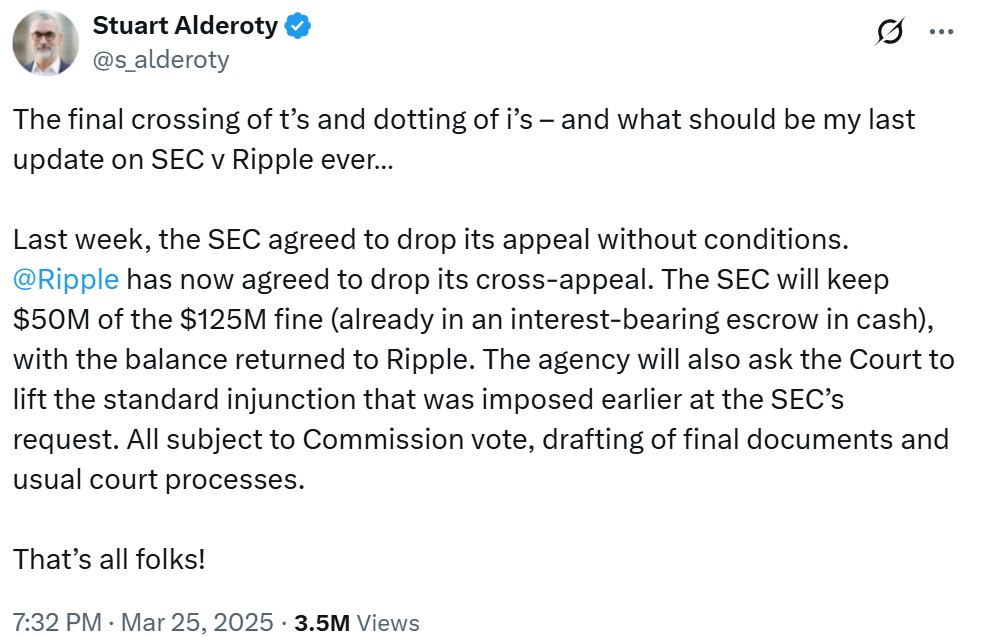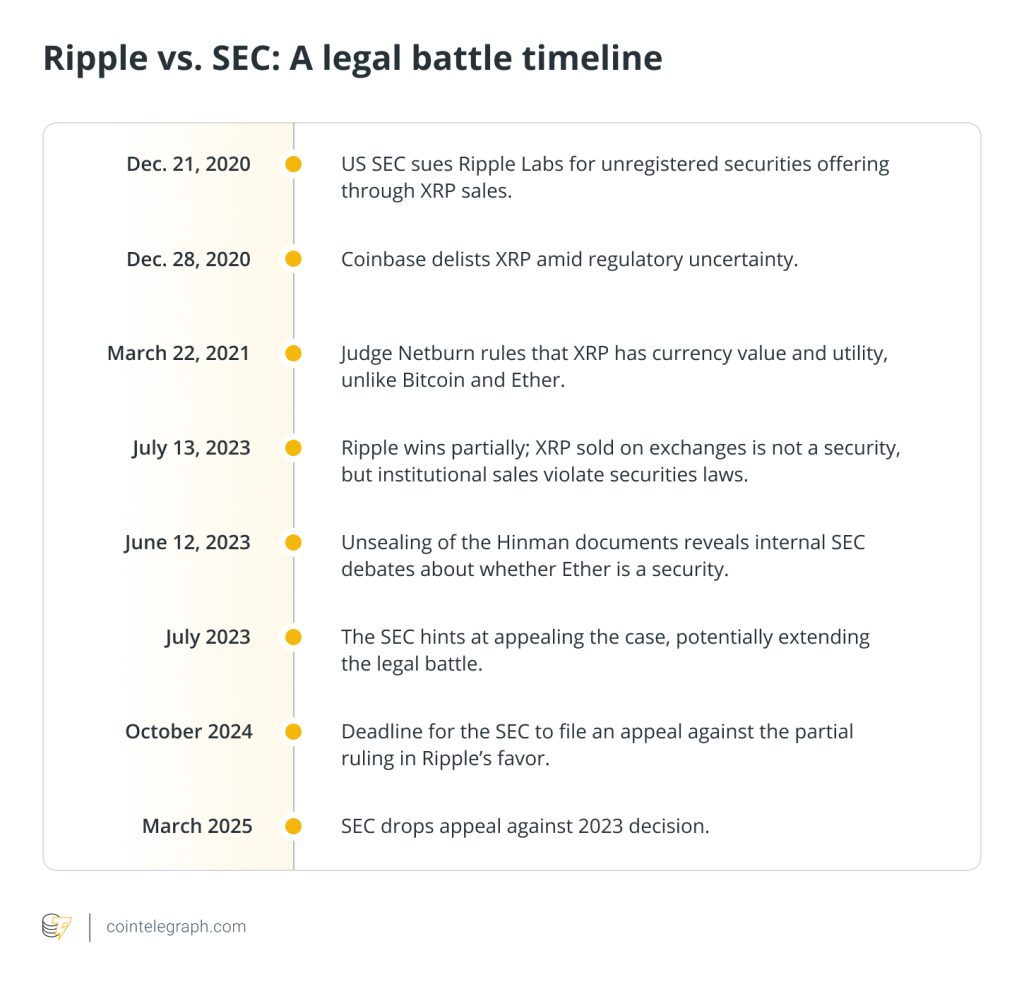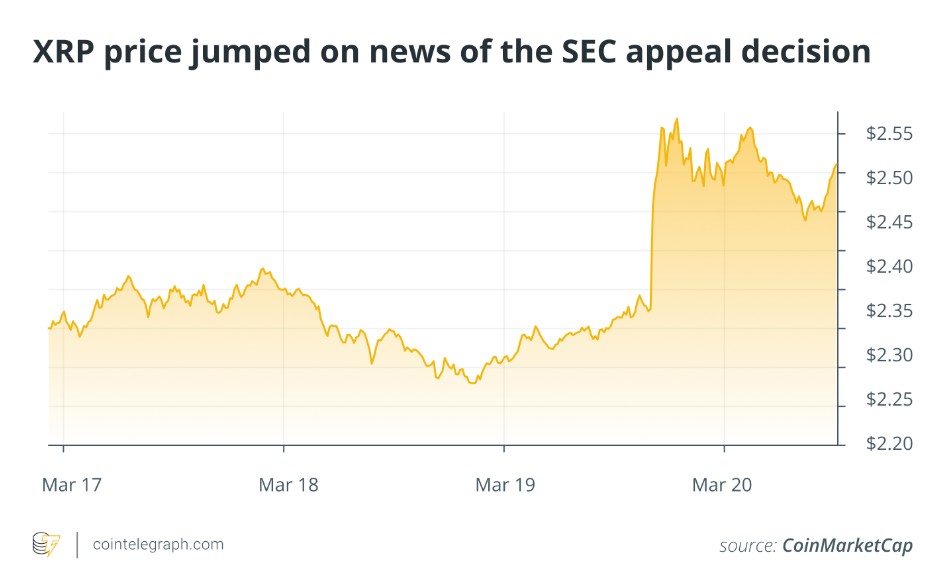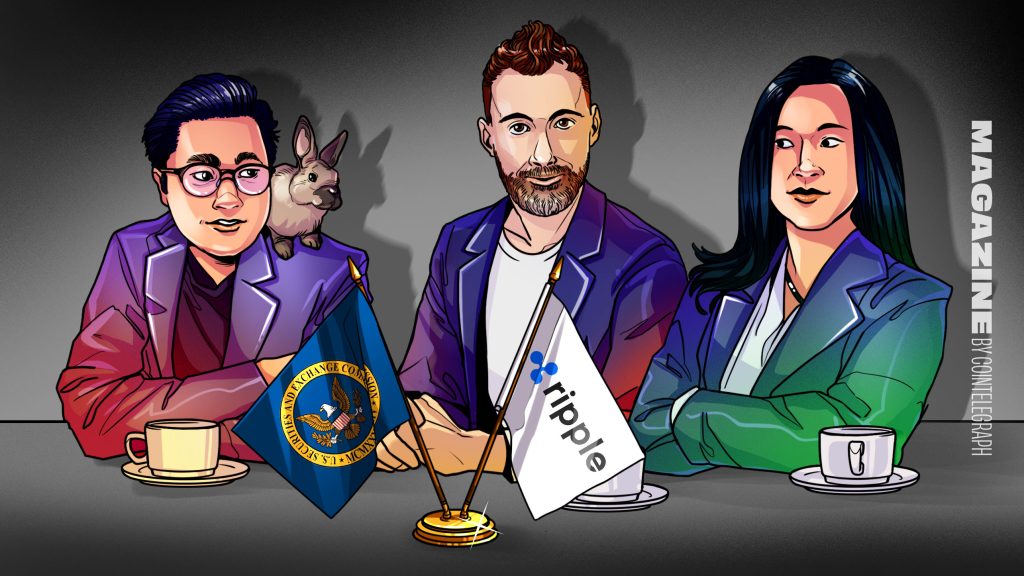UPDATE: The headline has been updated to reflect Ripple’s clarification the “bad actor” designation was not applied as part of its settlement with the SEC.
Ripple has emerged (mostly) victorious from its long-running battle with the Securities and Exchange Commission, but for legal experts, the case’s conclusion feels like a missed opportunity.
Since the case didn’t advance to a higher court, Judge Analisa Torres’ original district court decision — which famously differentiated between XRP sales to institutional investors and those on exchanges — has not established a binding precedent.
For the wider industry, the case’s murky status leaves companies struggling with unanswered questions: How should token offerings be structured? What legal weight does Torres’ decision really carry? And what happens now that the SEC seems to be pivoting away from enforcement-heavy tactics?

Add to this the broader context of evolving frameworks overseas, including the EU’s MiCA regulation and Hong Kong’s move to position itself as a global Web3 hub, and it becomes clear that the Ripple case is just one part of a rapidly shifting legal landscape.
To understand the true impact of the case’s resolution, Magazine brought together legal experts from across the globe: Charlyn Ho of Rikka from the US, Yuriy Brisov from Digital & Analogue Partners in Europe, and co-chair of Hong Kong Web3 Association Joshua Chu. Together, they unpack what Ripple’s “win” really means for crypto law, and whether the industry is any closer to clarity than it was four years ago. This discussion has been edited for clarity and length.
Magazine: What implications does the end of the long-running case have for other crypto firms?
Ho: There were lots of hopes about increased clarification. It was a partial win for the SEC, a partial win for Ripple; and then the SEC was going to appeal the decision that was not favorable for it, and then Ripple was going to appeal the decision for the portion of the decision that was not favorable for Ripple.

But because the SEC has now dropped the complaint and the claims against Ripple, part of the settlement discussions was Ripple agreeing to drop its appeal as well.
The challenge is that settlements are often confidential. So we may not get that clarity the industry seeks.
Brisov: This is probably good for Ripple as we saw with XRP price reacting. They still have to pay a fine but they won’t have to fight any longer. For the whole industry, it just means that the precedent that everyone was really expecting for over four years also would not happen. If you want your case to become a precedent in a circuit, it must reach the circuit level. This case didn’t.

But in SEC versus Coinbase and all the other crypto litigations at the moment, they’re already citing this decision. However, it’s just a persuasive authority. It’s like the court decision from another jurisdiction, or the opinion of an expert or a scholar. It didn’t create a binding legal precedent, but I think that future handbooks and university programs will definitely cite this case to teach the new generation of digital lawyers.
Magazine: Does that mean this case can’t be used as a precedent?
Ho: The district court decision is still legal precedent. The judge still gave a ruling. I think it’s not fair to say it’s not legal precedent in any sense of the meaning of the word, but it is not as clear as we would have liked, because Judge Torres is one judge. There were other judges actually in the same court that ruled differently, like in cases like the Terraform Labs case.

Chu: It’s actually a missed opportunity insofar as legal development is concerned.
Magazine: Ripple was hit with a “bad actor disqualification” under Rule 506 of Regulation D. What does that mean and is this restriction still in place?
Brisov: Crypto projects usually use Reg D, which means offering securities to other institutional investors in the US. It’s not a public offering but rather a private offering.
When you’re considered a bad actor, it means that you violated the rules of Reg D in violation of the securities laws. This means that you’re banned from using this regulation for five years.
This decision stays. So Ripple won’t be able to offer any more institutional deals with VCs for their tokens.
Editors note: Ripple reached out to Magazine after publication to clarify that the “bad actor” designation under Rule 506 of Reg D was not applied as part of their settlement with the SEC.
Magazine: But they already have done that and that’s why this case was brought about.
Brisov: That is right. In the real world economy, I think that it’s a full victory for Ripple. The bad actor decision doesn’t affect Ripple’s market strategy.

Magazine: During Gensler’s era, crypto firms in the US complained about banking service access. Are there similar cases of crypto debanking in the world and have we seen any countries move to stamp it out?
Chu: Without wishing to disclose the names of our clients, I do recall having to deal with a number of banks. Back in 2017, crypto didn’t really have the reputation it has today. Most of the time people were prejudiced against crypto and it was for a long time viewed as something that only people within the fringe parts of society, drug dealers and whatnot, will use.
As a result, a lot of banks did adopt the policy. I wouldn’t say it’s regulatory induced, but banks also have their own risk appetites when it comes to Anti-Money Laundering concerns. And these might be reasons why a lot of times crypto faces hurdles when it comes to opening accounts, as well as accounts suddenly being closed. And you have to understand this as well: traditional money laundering red flags will be triggered by the very nature of how crypto trading operates. One of the red flags in AML is when you suddenly have a huge amount of money coming in that is off the charts from what you are normally getting. That will result in a freeze or enhanced due diligence.
Now that having been said, regulators in Hong Kong, especially when the government decided to become a Web3 hub, proactively encourage banks to become more open-minded. They can only encourage. If your account operator ends up doing something that’s money laundering related, the risk still falls on the banks.
Magazine: Over in the European Union, is MiCA simplifying banking access for European firms?
Brisov: MiCA is very complex, and it will take several years for European companies to adjust to it. It’s important to understand that MiCA is not complete. There are still legislative committees that are working on MiCA part two and it should, in the end, cover all the other tokens, not only payment tokens.
What’s happening now in the EU market is, every company that deals with crypto projects is still asked by banks, financial institutions and other parties they deal with on a daily basis to provide their MiCA compliance or whether they have a license or something like that. The market is 100% confused at the moment with MiCA.
Magazine: So is MiCA forcing crypto companies out of Europe?
Brisov: For global players like Circle, it’s an opportunity. These days, if you have money and employ enough lawyers and tech specialists to become MiCA compliant, you almost become a monopoly in this market. They won’t be restricted for quite some time during this MiCA adjustment period; the anti-monopoly authorities won’t prosecute these players.
Meanwhile, many smaller companies are dissatisfied with MiCA, including those that aren’t even using any EMT or ART. Some companies just move to different jurisdictions, obviously to the UAE and Hong Kong. They’re also moving to the islands like BVI and Cayman.
Magazine: Hong Kong is becoming increasingly attractive to crypto firms thanks to its regulatory clarity. Can you explain the newly passed Protection of Critical Infrastructures Bill and what it means for the industry?
It’s what is colloquially known as the Cybersecurity Law. It creates this new commissioner within the government who is essentially the cybersecurity czar. There are a certain number of policies and laws in place that will be very strict upon companies that are considered as critical infrastructure. That includes banking, finance, and telecommunication.

Considering the fact that we’re aiming to be the crypto hub, it’s reasonable to foresee that the government may just opt in saying certain virtual assets will fall under critical infrastructure as well.
We have recently had the biggest crypto heist at Bybit in February. Imagine if the company didn’t have to go at it alone but had the entire heavy weight of the government taking proactive steps to basically reign in the situation instead of relying on the mercy of other ecosystem partners — which is actually great and heartwarming, but is it always sufficient?
So if the crypto trading platform in question turns out to be considered a critical infrastructure or not it really brings it to the next level of cybersecurity. This list is not publicly available in order to avoid painting them as a target. It gives a lot more confidence for market participants as well saying, we are basically working with a platform that is not going to be knocked out just because of a crypto heist by North Korea.


Yohan Yun
BTC cracks $30K, supply squeeze worsens, XRP implodes: Hodler’s Digest, Dec. 27–Jan. 2
The best (and worst) quotes, adoption and regulation highlights, leading coins, predictions and much more — one week on Cointelegraph in one link!
Read more3AC-related OX.FUN denies insolvency rumors, Bybit goes to war: Asia Express
New 3AC controversy as OX.FUN rejects claims its assets are mostly its own token, plus sleuths trace stolen Bybit funds. Asia Express.
Read moreBitcoin ‘bullish’ in Q1 says Willy Woo, XRP lacks CLARITY: Trade Secrets


